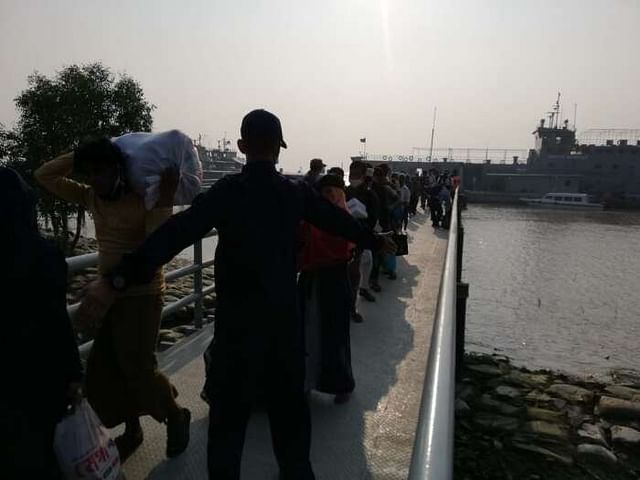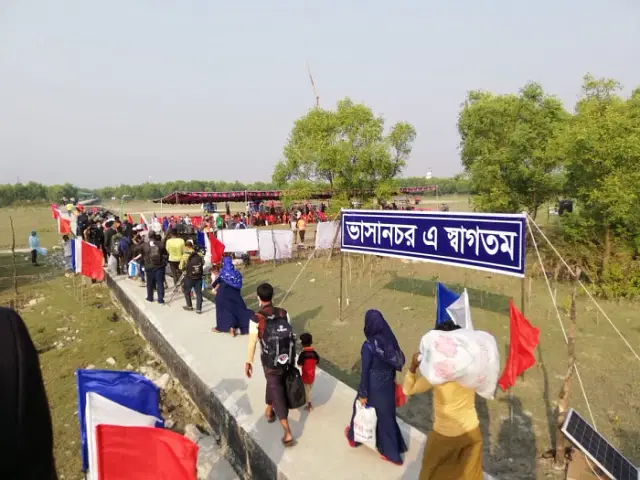First batch of Rohingyas reaches Bhasan Char

The sun on Friday, 4 December, seemed a bit brighter than normal. The media team from Dhaka entered the Chattogram Boat Club Friday morning, looking for the Rohingyas who were set to depart for Bhasan Char. It wasn’t long before the men, women and children came into sight, walking in lines towards the seven waiting vessels of the navy and the army. The vessels would carry them to Bhasan Char.
Why were they leaving Cox’ Bazar for Bhasan Char? Were they going voluntarily? Or were they being forced by the government? The island was far. Would they feel all right, far from their friends and relatives on this isolated island?
These questions were posed to them. Most of them had the same answer. As time passed, their repatriation to Rakhine was steadily fading. Meanwhile, security and other problems were increasing at the camps in Cox’s Bazar. So when Bhasan Char was offered to them as an alternative, they decided on their own accord to relocate from Cox’s Bazar to Bhasan Char.

A couple, Raziullah and Mohsenia Begum of Buridong in Rakhine, said their relatives had been burnt to death during the atrocities of August 2017. Since then they have been sheltered at Camp 19 in Thangkhali, Cox’s Bazar. Raziullah, who has been working as a day labourer for the past three years, told that he had no idea when they would be able to return to Rakhine. And even if they did, there was no guarantee that they would be able to stay there. Then again, security risks were increasing in Cox’s Bazar. “Then we learnt that there would be food provided in Bhasan Char. There would be opportunity to work. And most importantly, the children would get an education. Hearing about all these facilities, we happily decided to come to Bhasan Char. There was no pressure to take this decision,” he said.
The 11-year-old Sanwara Begum has come to Bhasan Char with her parents. She said if her father had work, then they wouldn’t have to worry about food. Also, she could go to school here. There was no reason for them to have any qualms about coming to Bhasan Char if work, food and studies would be provided.
Jamila Begum’s husband was killed in the Balukhali camp. She now depends on her four sons. Two of them work at the office of the Rohingya camp officer-in-charge. Her sons had told her about Bhasan Char. She had come here with her two sons for some security and respite. “My sons are growing up,” said Jamila Begum, “We have to live in cramped conditions in Cox’s Bazar. Security problems are also on the rise. That’s why it seems better to stay at Bhasan Char.”
Travelling with the Rohingyas on Friday, it was quite amazing to see relief and happiness. The government officials were visibly relieved too

The international community from the very outset has been vehemently against the relocation of Rohingyas to Bhasan Char. They are still questioning the effectiveness of this relocation. In the meantime, the government is breathing a sigh of relief, having brought the batch of Rohingyas to Bhasan Char. Given the international debate on the issue, the concerned officials hadn’t imagined this move would bring so much good cheer and smiles to the Rohingyas.
Travelling with the Rohingyas on Friday, it was quite amazing to see relief and happiness. The government officials were visibly relieved too.

From 9:00am, the Rohingyas began boarding the vessels in lines. They first sanitised their hands, changed their masks and then boarded the boats. Once on the boats, they donned lifejackets.
This correspondent travelled with the Rohingyas on one of the vessels. It was a four-hour journey approximately. It was noticeable to see that the faces which had always been shadowed with anxiety, were now all smiles.
A BRAC school team leader, Nurul Amin, was having a good time. He and his family – seven in all, including parents, wife and children – were on the way to Bhasan Char. He said security was the main reason they were relocating. He hoped to work in the school at Bhasan Char too.
Things are different for Hossain Ali of Balukhali. While he had been in jail for five years in Rakhine, his wife had left him. Then he lost many members of his family in the 2017 crackdown. He has been living alone in Cox’s Bazar since then. He seeks solace in the quiet Bhasan Char, away from the chaos in Cox’s Bazar.
Mabia Khatun, travelling to Bhasan Char with her day labourer husband Mohammad Hossain and their four-year-old daughter, was all smiles. But would she be happy there, away from familiar faces and near ones? She replied, “How can I say that I will be unhappy on Bhasan Char unless I actually stay here? But it seems to be good, with food and all facilities.”

Prayers and settling in
After they reached Bhasan Char after 2:30pm, naval officers and other officials greeted the Rohingyas. Everyone’s temperature was measured and then they were taken in vehicles to the Bhasan Char warehouse. Over there a Rohingya, on behalf of those present, expressed gratitude to the government and the people of Bangladesh and offered prayers.
Next, officials of the refugee relief and repatriation commissioner’s office briefed the Rohingyas about where they would stay. At the end of the briefing, the Rohingyas proceeded towards their rooms.
Commodore Mamun Chowdhury said, this is just a temporary relocation. Once repatriation begins, they will be sent back to Rakhine.
Food and other preparations
When the vessels carrying the Rohingyas reached Bhasan Char in the afternoon, a ship carrying humanitarian aid, including food, was already anchored there. The additional refugee relief and rehabilitation commissioner, Shamsuzzoha Nayan, told that for the first five to seven days they would be provided with cooked meals. After that, as in Cox’s Bazar, 19 items, including rice, dal (lentils) and oil would be provided to them at their homes.
He said, he and a number of other officials of the Rohingya camps in Cox’s Bazar, would supervise the humanitarian aid work over the next few days for the people who had arrived at Bhasan Char.
The day began with a festive feel among the Rohingyas and at the end of the day, the Bangladeshi officials were well pleased. It was a relief that the first batch of Rohingyas was brought to Bhasan Char with no serious hitch.
Commodore AA Mamun Chowdhury, the director of the Bhasan Char project, known as the Asrayan-3 Project, officially briefed the Rohingyas in the afternoon at the local warehouse and later told the newspersons that it seemed to be a sort of festival. Everyone was smiling and free of tension. “We hope, as directed by the prime minister, to maintain this festive environment. As a member of Bangladesh Navy, I am proud to be part of such a huge task. The others will come in phases. The project has prepared facilities for 100,000 people,” he said.
Commodore Mamun Chowdhury said, this is just a temporary relocation. Once repatriation begins, they will be sent back to Rakhine. There is no local community here, only Rohingyas. There are facilities here for fish farming, cultivation and rearing livestock. A decision will soon be taken whether all this will be run by NGOs or the concerned ministry.”


No comments